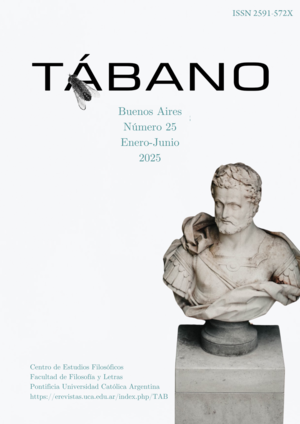“El artesano cósmico: una bomba atómica casera”. La estética sublime de Deleuze y Guattari
DOI:
https://doi.org/10.46553/tab.25.2025.e6Palabras clave:
Estética, Sublime, Deleuze, Guattari, ArteResumen
Para Deleuze y Guattari, el arte es una bomba, y el artista es un revolucionario que crea dispositivos incendiarios que explotan más allá de nuestras expectativas, nuestras regulaciones y nuestras normas representativas. Pero, ¿qué es esta explosión del arte? Es la fuerza bruta de la sensación, una sensación que va más allá de los límites de nuestra capacidad para representarla, algo que siempre es nuevo e indeterminado por nuestras condiciones físicas, conscientes o históricas. Esta sensación abrumadora surge de la fascinación de Deleuze con lo sublime de Kant, que en una forma significativamente alterada aparece en Diferencia y Repetición como la clave de la estética propia de Deleuze, la cual se fundamenta en la discordia de las facultades. La lectura revisionista de Deleuze sobre lo sublime abre el sistema de Kant a nuevas posibilidades, algunas de las cuales ni siquiera el propio Kant conocía. Lo sublime sigue siendo el principio de la estética de Deleuze en su obra posterior, en particular en los libros sobre Cine y en Lógica de la sensación, Francis Bacon.
Descargas
Citas
Deleuze, G. (1978). Deleuze Kant: synthesis and time, 14 March 1978. Trans. M. McMahon. Available at https://www.webdeleuze.com
Deleuze, G. (1978a). Deleuze Second lesson on Kant, 21 March, 1978. Trans. M. McMahon, available at https://www.webdeleuze.com.
Deleuze, G. (1978b). Deleuze Third lesson on Kant, 28 March, 1978. Trans. M. McMahon, available at https://www.webdeleuze.com
Deleuze, G. (1978c). Deleuze Fourth lesson on Kant, 4 April, 1978. Trans. M. McMahon, available at https://www.webdeleuze.com
Deleuze, G. (1983). Nietzsche and Philosophy. Trans. H. Tomlinson. Columbia University Press.
Deleuze, G. (1984). Kant’s Critical Philosophy, The Doctrine of the Faculties. Trans. H. Tomlinson and B. Habberjam. University of Minnesota Press.
Deleuze, G. (1986). Cinema 1, The Movement-Image. Trans. H. Tomlinson and B. Habberjam. University of Minnesota Press. DOI: https://doi.org/10.5040/9781350251977
Deleuze, G. (1988). Foucault. Trans. S. Hand. Continuum Press.
Deleuze, G. (1989). Cinema 2, The Time-Image. Trans. H. Tomlinson and R. Galeta. University of Minnesota Press.
Deleuze, G. (1994). Difference and Repetition. Trans. P. Patton. Columbia University Press.
Deleuze, G. (1997). Essays Critical and Clinical. Trans. D. W. Smith and M. A. Greco. University of Minnesota Press.
Deleuze, G. (2003). Francis Bacon: The Logic of Sensation. Trans. D. Smith. Continuum.
Deleuze, G. (2004). Desert Islands and Other Texts 1953-1974. Trans. M. Taormina. Ed. D. Lapoujade. Semiotext(e).
Deleuze, G. & Guattari, F. (1983). Anti-Oedipus, Capitalism and Schizophrenia. Trans. R. Hurley, M. Seers and H. R. Lane. University of Minneapolis Press.
Deleuze, G. & Guattari, F. (1987). A Thousand Plateaus, Capitalism and Schizophrenia. Trans. B. Massumi. University of Minnesota Press.
Deleuze, G. & Guattari, F. (1994). What Is Philosophy? Trans. H. Tomlinson and G. Burchell. Columbia University Press.
Guattari, F. (1995). Chaosmosis, an ethico-aesthetic paradigm. Trans. P. Bains and J. Pefanis. Power Publications. Kant. I. (1929). Critique of Pure Reason. Trans. N. Kemp Smith. Macmillan.
Kant. I. (1987). Critique of Judgment. Trans. W. S. Pluhar. Hackett Publishing Company.
Maïmon, S. (2010). Essay on Transcendental Philosophy. Trans. N. Midgley, H. Somers-Hall, A. Welchman and M. Reglitz. Continuum.
Publicado
Cómo citar
Número
Sección
Licencia
Derechos de autor 2024 Stephen Zepke

Esta obra está bajo una licencia internacional Creative Commons Atribución-NoComercial-CompartirIgual 4.0.



